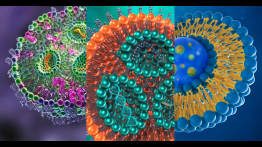Kraut Guest Lecture in ChE: Lipid Nanoparticles for Overcoming Biological Barriers to mRNA Delivery
Thursday, October 5, 2023, 5 - 6pm

Michael J. Mitchell, Ph.D., associate professor of bioengineering at the University of Pennsylvania, will deliver the 2023 Theodore, Mary, and Sara Kraut Lecture in Chemical Engineering on the topic of "Lipid Nanoparticles for Overcoming Biological Barriers to mRNA Delivery." The talk is supported by the Chemical Engineering Department of the Albert Nerken School of Engineering.
Registration required. Please note this free event is first-come-first-served, and an RSVP does not guarantee admission.
Recent years have witnessed tremendous developments and breakthroughs in the field of RNA-based therapeutics and vaccines. The distinct mechanisms of exogenous RNAs and analogs, including messenger RNAs, small interfering RNAs, microRNAs, and antisense oligonucleotides, have brought them unprecedented potential to treat a variety of pathological conditions. However, the widespread application of RNA therapeutics and vaccines is hampered by their intrinsic features and formidable host barriers. Development of safe and efficient vectors is key for successful delivery and translation of RNA therapeutics and vaccines.
Highlights of the lecture will include:
- The development of lipid nanoparticle (LNP) platforms that enable the delivery of RNA therapeutics and vaccines to a range of target cells and tissues in the body
- New therapeutic strategies utilizing these LNPs including in vivo reprogramming of immune cells for cancer immunotherapy and vaccination; in utero gene editing for treating disease before birth; and mRNA prenatal therapeutics for treating pregnancy disorders such as pre-eclampsia.
Michael J. Mitchell is an associate professor of bioengineering at the University of Pennsylvania, and the Lipid Nanoparticle Delivery Systems Group Leader at the Penn Institute for RNA Innovation. The Mitchell lab’s research broadly lies at the interface of biomaterials science, drug delivery, and cellular and molecular bioengineering to fundamentally understand and therapeutically target biological barriers. Specifically, his lab engineer's new lipid and polymeric nanoparticle platforms for the delivery of different nucleic acid modalities to target cells and tissues across the body. His lab applies their research findings and the technologies developed to a range of human health applications, including the engineering of CAR T cells for cancer immunotherapy, mRNA vaccines, genome editing, cardiovascular disease, and in utero therapeutics to treat disease before birth.
Located in the Frederick P. Rose Auditorium, at 41 Cooper Square (on Third Avenue between 6th and 7th Streets)




